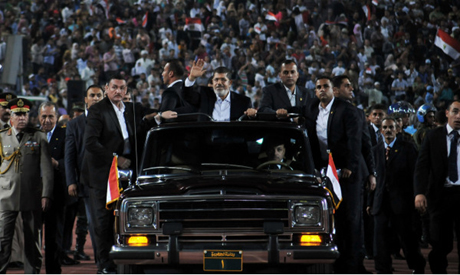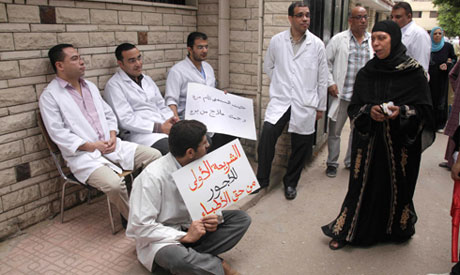
President Morsi greets the crowd at Cairo Stadium at a rally to commemorate the 6 October war. (AP)
On the 100th day of his presidency, Egypt's president Mohamed Morsi issued a blanket pardon, Monday evening, for all citizens arrested during protests held since the start of the January 25 Revolution until 30 June this year, when he was inaugurated. The pardon, according to the presidential decree, includes those who are currently facing trial as well as those already serving jail sentences.
"The blanket pardon applies to whoever been sentenced during the January 25 Revolution while trying to support the revolution," the presidential decree read, adding that the amnesty excludes those convicted of murder.
Morsi's legal consultant Mohamed Gadallah to Al-Jazeera Mubasha Misr, Monday evening, that the pardon will include military officers who were arrested for participating in pro-revolution protests.
A few days earlier, during a speech in the Cairo Stadium to commemorate the 1973 '6 October War', Morsi gave himself a performance review, looking back at the promises he made when taking office.
“I take responsibility with you and before
you for the 100 days and beyond the 100 days,” he said before offering
statistics on how many goals he had achieved.
One of his promises concerned the improvement of the quality and
availability of bread, which poor Egyptians had to queue for during
former President Hosni Mubarak’s era. In some instances, deadly fights over bread
broke out between people queuing. “Around 80 per cent of the goals have
been achieved,” Morsi claimed, adding that quality still needs to be
improved. A watchdog website, called “Morsi Meter”, which was set up
to follow up on Morsi’s promises, tells a different story. Of the 13 promises Morsi made regarding
bread, only three have been achieved and seven
more were in progress, according to the site.
As for the
availability of household gas and fuel at the pump, both of which have
been in short supply and which was another one of Morsi's promises, Morsi said to have achieved '85 per cent of the
household needs of gas cylinders'. He added that among the reasons for not doing
better was the smuggling of fuel. “In just two months, 23 million litres
of fuel have been seized,” he said. However, the Morsi Meter reported that of the
five promises related to fuel, only the promise to implement deterrent
punishments for smugglers has been achieved, while one of the remaining
four is in progress.
Regarding security, Morsi said that 70 per
cent of his goals have been achieved. He saluted the men of the Interior ministry for their efforts. The Morsi Meter claims
that only one of the promises Morsi made regarding security has been
met: to give promotions and benefits to police officers, commensurate
with performance.
As far as traffic was concerned, Morsi claimed that he had achieved 60 per
cent of his promises. The Morsi Meter estimates that only one of his 21 promises has been
completed. And regarding the removal of garbage around 40 per cent of the promises were achieved, Morsi claimed. He said over 600,000 tons of
garbage have been removed from the Greater Cairo region, 200,000 tons
from Alexandria and 350,000 from other governorates. According to Morsi
Meter, this is the only sector in which all of the president’s goals
have either been achieved or are in progress.
| traffic in Cairo |
"Instead of forging economic policies in favour of the poor by setting a minimum and maximum wage, forcing progressive taxation and renationalising the country’s robbed companies, Morsi chose to side with the rich and follow the same path as the old ruling party in depending on loans," Imam opined, referring to the controversial $4.8 billion sum from the International Monetary Fund that Morsi's administration is currently negotiating.
On the level of freedom of expression there is concern about the position of journalists and the freedom of speech. Particularly worrisome is the rise of cases of "contempt of religion". Last month, Coptic Christian schoolteacher Bishoy Kamel was sentenced to six years in prison for posting cartoons on Facebook deemed defamatory to Islam, the Prophet Mohamed, President Morsi and Morsi's family.
Another case which sparked national and international uproar last week was the detention of two Coptic children charged with insulting Islam. The nine and ten year olds, who allegedly tore up verses of the Quran, were shortly released pending investigation.
Hossam Bahgat of the Egyptian Initiative for Personal Rights (EIPR) also complained that the return of the police had conversely increased instances of citizen rights violations. "Morsi and his government still adopt the view that if they reform the police institution [as rights groups have been demanding] they will not be able to regain control of the security situation, a view which we completely reject," Bahgat said. According to an EIPR investigation due to be released next week, Bahgat asserted, "the level of torture witnessed at the hands of police in the past month and a half is equivalent to that witnessed in the past 18 months."
 |
| A patient walks past striking doctors.(AP) |
Rights activist Aida Seif El-Dawla of the Nadeem Centre for Rehabilitation of Victims of Violence agreed, adding that over the course of the last few months the increase in police presence has contributed to the levels of violence during instances of social unrest. Student sit-ins have been violently dispersed, the rights advocate continued, for example when a month-long Nile University protest was forcefully evacuated by Central Security Forces (CSF) three weeks ago. Workers' strikes were similarly attacked using "old [regime] tactics" such as police cooperating with the business owners' hired private security, Seif El-Dawla added.
An increase in employees taking industrial action has been one of the most significant developments during the last 100 days. Since early July, transport workers, doctors and teachers have all staged intermittent strikes and protests against low pay and deteriorating living standards.


.jpg)


No comments:
Post a Comment